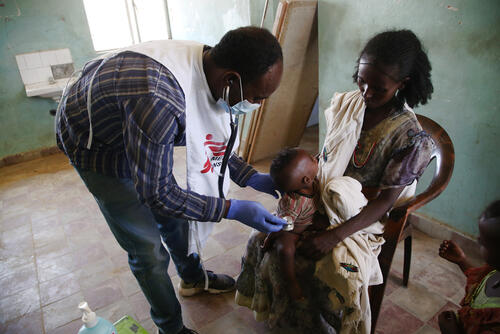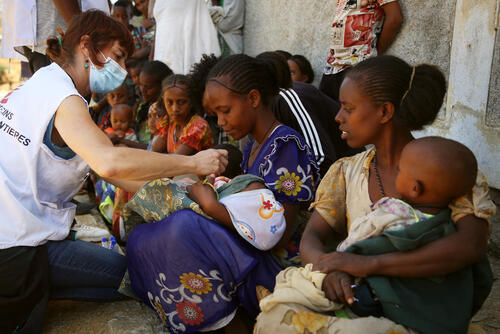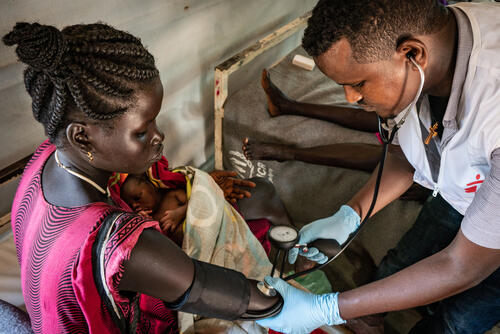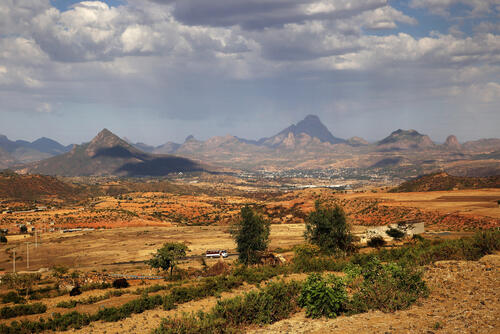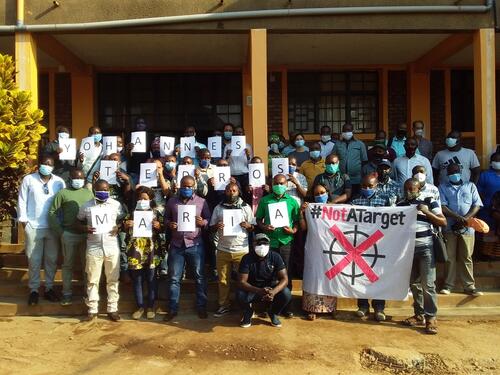Many of the six million people in Tigray, Ethiopia, live in mountainous and rural areas where they are all but invisible to the outside world. While teams of aid workers have been sent to the main cities of this northern Ethiopian region over recent months, aid is failing to reach more remote communities, where the impact of the conflict that sparked the current crisis has often been severe. Many people have been unable to access healthcare and other basic services for the past six months and are still living in fear.
When a small mobile team from Médecins Sans Frontières (MSF) reached Adiftaw for the first time in mid-March, they found the health post had been looted and partially destroyed. Medical files, broken equipment and torn medicine packets were chaotically dispersed across the floors of every room; none of the beds had mattresses; and no medical staff were present.
Adiftaw, a village in the conflict-hit Tigray region, is situated three hours north of Axum along hilly dirt roads.
What the team found was nothing new and echoed their experiences on almost every visit to a new place anywhere across Tigray, from east to west and from north to south .
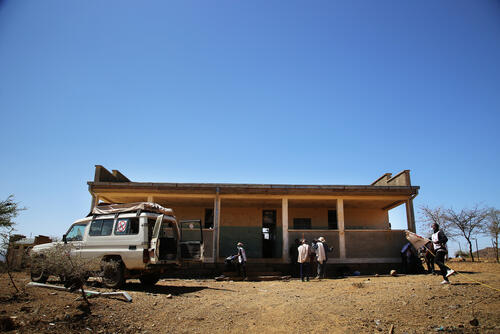
In the months since November 2020, the 10,000 people living in and around Adiftaw have been unable either to see a doctor or be referred to a hospital for specialist care. Soon after the MSF team had cleaned up the health post and opened a temporary mobile clinic, dozens of people showed up, arriving slowly but steadily from all directions.
Mostly they were mothers carrying small children wrapped on their backs. But others arrived too: young men carried an elderly man, apparently sick with malaria, sitting on a wooden chair attached to an improvised stretcher; several elderly women appeared, their bodies aching from chronic conditions. However, not everyone got the help they sought. The medical staff were focusing on children, pregnant women and people needing emergency care.
About an hour after starting triage, MSF staff had to announce they could not let any more patients in that day, as the medical staff simply did not have capacity to see anyone else in the three-hour window for consultations .
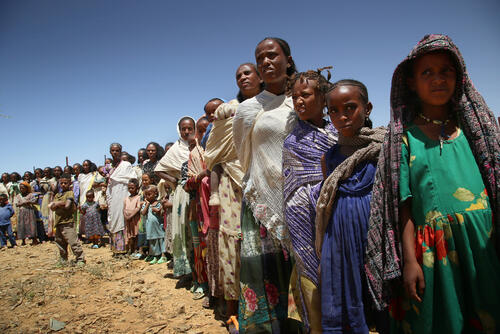
High impact of the violence
Beyond people’s health needs, community elders in the area said the violence had hit people very hard. Some farms were still occupied by soldiers, the village’s mill was not functioning, and the water system was broken after the pumps at the boreholes had been deliberately shot at. As a result, villagers had to walk for hours to fetch water from a river, which they said was a source of diseases such as diarrhoea.
At the time of the MSF team’s visit, more than 100 houses had been burnt or damaged as a result of shelling and other violence, and dozens of inhabitants had reportedly died or gone missing, with some believed to be still hiding in the mountains. In recent weeks, some villagers had come back only to find they no longer had a house because it stood in ruins and people from other parts of Tigray, such as Humera and Sheraro in the west of the region, had moved in after being forced to flee their own homes.
“When we arrived in Tigray in late 2020, we found that the health system had almost completely collapsed,” says Tommaso Santo, MSF emergency coordinator. “Once we had set up support in hospitals in big towns such as Adigrat, Axum and Shire, it seemed essential to us to reach the more remote areas where people’s needs are greater.”
We are finding people with very little access to drinking water and food distributions... Many people are still living in fear in a situation of insecurity.Tommaso Santo, MSF emergency coordinator
Over recent months, our emergency teams have gradually expanded their activities to outlying areas across Tigray and currently run regular mobile clinics in about 50 different locations.
“Every time we get access to a new site, we send in a small team that can provide a minimum package of medical services,” says Santo. “We are finding people with very little access to drinking water and food distributions, and who cannot do commercial activity due to some markets being closed. Many people are still living in fear in a situation of insecurity.”
MSF teams are seeing large numbers of pregnant women with medical complications, some of whom are malnourished, which can increase the risk of diseases and death during pregnancy and childbirth. While child malnutrition varies from one place to another, moderate acute malnutrition has been on the rise in general across Tigray in the last months, says Santo, as the quality and quantity of food available has fallen sharply. Many families are eating just one meal a day and often only bread.
Some areas are in fact already showing levels of severe acute malnutrition well above the emergency threshold, like pockets on the outskirts of the city of Shire and in Sheraro. At the approach of the rainy season, the forecast for food supplies in the coming months is grim, as fields are often inaccessible to the farmers due to the conflict or they don’t have the means to plant the crops.
Well-functioning rural clinics now stand in ruins
Prior to the conflict, Tigray had a well-functioning and well-equipped health system that was among the best in Ethiopia. Health centres and health posts in rural areas covered people’s basic needs and were connected to the main hospitals through a fleet of ambulances that transported patients needing specialist treatment.
One such rural health centre was in the town of Sebeya, close to the Eritrean border. From the outside, the complex of buildings, which used to serve a catchment area of around 17,600 people, looks impressive, with its solid, well-spaced concrete buildings and various demarcated areas.
“Services here were good,” says Fatimah*, a 27-year-old woman from Sebeya. “I gave birth to all four of my children here. If the health staff didn’t have the capacity to do something, they’d send you to Adigrat. I never had to go, but other patients would be taken there in the health centre’s ambulance.”
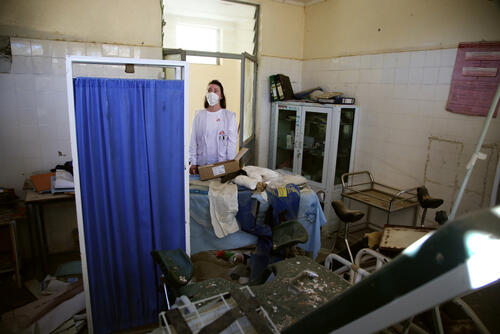
But then she lets the frustration show on her face. Currently the ambulance is missing and Fatimah, who is seven months’ pregnant, will not be able to deliver her fifth baby at this health centre. As she waits for an antenatal consultation with MSF medical staff, just metres away the health centre’s delivery room, where 40 to 50 women used to give birth each month, lies in ruins.
In mid-November, during the fighting, a number of rockets hit the delivery room and an administrative building. The two delivery beds and a radiant warmer for newborns are now covered in dust, plaster and splinters of wood. The floor is a mess of papers, damaged pressure gauges, broken utensils and dirty clothes. The harsh light of the dry season enters the room through a big hole in the wall and multiple smaller holes in the ceiling.
“These days women are delivering at home,” says Solomon,* a health worker. “Even if the birth goes well, newborns face the risk of dying. People with chronic conditions such as HIV, TB or diabetes are suffering due to the interruption of their medication. Children are dying due to pneumonia and malnutrition.”
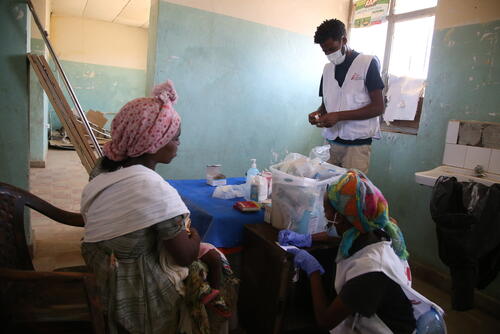
Fears and loss of livelihoods
For the residents of Sebeya, the partial resumption of medical services through a mobile clinic may be a positive step, but it is still a mere drop in the ocean. Most people here have lost their livelihoods and experienced months of harsh conditions, if not direct violence.
“I was a merchant before the crisis,” says Mariam*, as she waits for her antenatal check-up. “I had a shop selling coffee, sugar and cleaning materials, but now it is closed. It was looted after we fled the town to seek refuge in my in-laws’ village. I was in hiding for four months and, even now, I am not yet back here permanently.”
“I used to have a good life and my only concern was improving the business,” she says. “We never thought the conflict would hit us. I never thought I’d find myself without food and having to hide in the bush.”
Close to 300 medical consultations were carried out in Sebeya and Adiftaw by our mobile clinic teams. Apart from sexual and reproductive health issues, the most common conditions seen, particularly among children, were malnutrition, pneumonia, diarrhoea and skin diseases, related to poor living conditions and little access to clean drinking water.
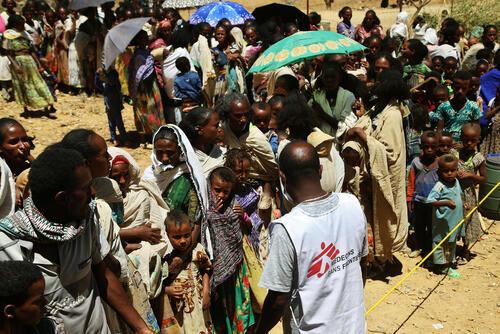
Insufficient aid beyond towns and cities
“We try to prioritise the areas where we should continue responding,” says Santo, “and we try to increase the services on offer: it might be family planning, antenatal consultations, vaccinations or other services, none of which have been available for months.”
There is also a clear need in rural areas for treatment and care for victims and survivors of sexual violence, which has been a recurrent feature of the conflict. Over recent months, MSF-supported hospitals in cities have been admitting rising numbers of women seeking assistance to cope with traumatic experiences and terminate unwanted pregnancies.
Much remains to be done to expand people’s access to these and other critical support services. While more humanitarian organisations have sent teams to Tigray, especially since February, the response on the ground is still extremely limited as it hardly ever extends beyond the larger towns.
“Rural areas are often left without any kind of assistance and in recent weeks access for humanitarian organisations to various parts of Tigray has been further constrained,” says Santo. “There is an urgent need to scale up humanitarian assistance and to expand its reach.”
MSF currently runs medical projects in the Tigrayan cities and towns of Adigrat, Axum, Adwa, Abi Adi, Shire, Sheraro, Humera and Dansha. Since early 2021, MSF mobile teams based in these locations have progressively expanded their activities to rural towns, mountainous areas and villages in parts of the region where the health system is not functioning.
Over recent months, MSF mobile teams have visited more than a hundred different locations, either to run temporary mobile clinics or to supply health centres that had been looted and to train health staff.
There are still rural areas in Tigray that neither MSF, nor any other organisation, has been able to reach; MSF can only assume that people living in these areas are also without access to healthcare.
*Names have been changed to preserve anonymity



